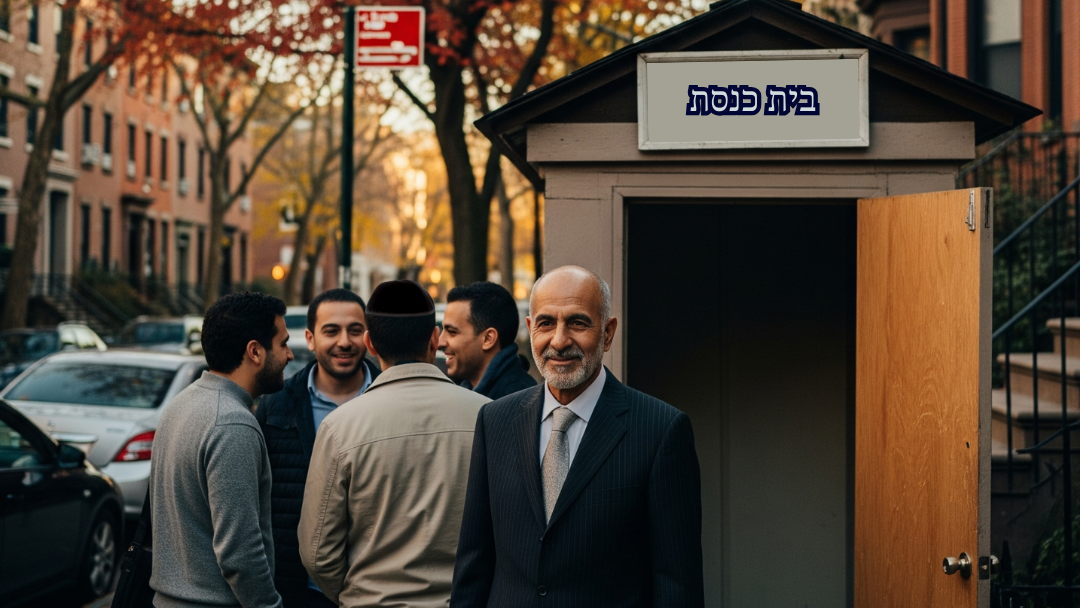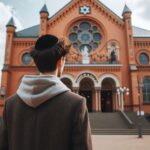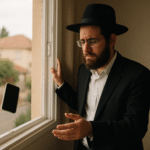Yes, they prayed in Hebrew. Yes, they greeted him with “Shabbat shalom” when he entered the synagogue, when he was called to the Torah, and when he marked his parents’ yahrzeits. He was the only Sephardi on the roster who paid his annual dues each High Holiday season. Yes, they were kind—asked after his wife and children and invited him to kiddush at the end of services. Some even added him to invite lists for yahrzeit gatherings and small celebrations held in the synagogue’s courtyard tent.
The first time he arrived, he was startled. He thought he’d come to a private house, but the community insisted this was the place. Only later did he understand that this is how you build a suburban synagogue: not a purpose-built structure with sanctuary, hall, and women’s gallery, but a converted home. The living room became the sanctuary, a low fence served as the partition, and the big backyard turned from private garden into the social hall. Kiddush was held in the basement.
Inside that house he even had his own chair. Between Rosenberg and Katz sat, proudly, David Siman-Tov. He wasn’t in the front rows—reserved for founders, board members, and major donors—but they told him it was a good spot, close to the bookcase and with a clear view of the picture on the wall. Instead of a famous rabbi or an illustration of the Exodus, Natan Sharansky gazed down on him throughout the prayers. Siman-Tov was puzzled, until he learned the shul had been founded by former Prisoners of Zion from the USSR; for them, Sharansky was a master and guide—much as Rabbi Meir Baal Ha-nes had been for his grandmother in Morocco.
David came to the city in the ’80s. He left Jerusalem to “do business”—and business he did. He’d barely finished high school in Katamon, but he wasn’t afraid of hard work; and timidity is not a Moroccan trait, so in that New York the chutzpah-inclined thrived.
He leveraged his build—small but strong and sturdy—to enter a booming trade: moving. At first he worked for an old-line company, where he met the guys who dominated the market and spread “Israeli muscle” across the boroughs. Later, once he’d had enough and the heavy lifting fell to the Hispanic crews who came a few years after him and didn’t mind getting their hands dirty, he moved to the next thing: taxis.
Crime ebbed, tourists surged—and everyone dreamed of riding in a yellow cab with a little TAXI sign like in the movies. The snag was the medallion. Most Israelis solved that through Racheli. Racheli Azaria, daughter of Meir Azaria—an old-guard Jewish businessman who had spotted the opportunity in the ’60s and cultivated ties in the licensing bureau—sat at the city’s most valuable intersection: a tiny office worth millions. One stamp from her and the medallion number was on its way; anger her—or worse, her father—and your odds of getting a cab were about the same as your odds of getting a date with her.
Racheli was pleasant to everyone, but she drew a bright line. David hit that wall, and despite his efforts and attempts to “play” their shared Moroccan origin, the wall held. She wasn’t sure whether it was real or just a bid to cut the line, and preferred not to risk it. Only after she had already approved his number—and he kept pressing, sending friendly feelers to her father—did she decide: David deserved a chance. A tiny romance budded; at last the door opened—Friday-night dinner at the Azaria home. David stepped into character, did everything he could to be a prince, and by evening’s end he knew: the bride would come from here.
After he got the medallion, he drove the cab himself for a few months; once he saw the potential he teamed up with Moti and Yitzhak, and together they built a taxi company staffed entirely by Indian drivers—but it did not operate on Yom Kippur. That was the Israelis’ one condition: you could drive on Shabbat and festivals, money has no smell or passport—but Yom Kippur was different.
On that day, money has no atonement. The image of his grandfather wrapped in a tallit at the close of Ne’ilah, crying with the congregation “Hashem Hu Ha-Elohim!”, made him feel as if God Himself descended into the little synagogue in Casablanca—and he would not stain that feeling with dirty money.
In New York he found them all: Ashkenazim, Haredim, Sephardim, Conservative—and Reform. The Reform he truly did not like. They invited him once to an Shabbat Chatan, and he couldn’t understand why the rabbi was a woman and why she held a guitar instead of a siddur. She was very nice, and the sermon—more stand-up than the Torah talk he knew—was fine, but he felt out of place.
The real fury hit him at the buffet, where cheese canapés were served alongside “kosher” deli meats. “Why are you mixing meat and milk in the synagogue?” he asked the host. “The buffet isn’t exactly kosher—more kosher style,” the host replied with a polite smile. It was one of those phrases David would never understand: either it’s kosher or it isn’t. He had never met a middle road in Morocco, and it threw him.
When the apps stormed the industry, yellow cabs stayed popular mostly in the movies. David moved on. Together with Racheli and their three sons—already starting to lose themselves in New York—he realized it was time to head for the suburbs and buy the dream: white picket fence, big yard, and a basement to become the playroom where the grandchildren would one day run. And if there was even a bit of space—well, then maybe a pool or a little hot tub. The house of unlimited possibilities.
The first suburb was too far; in the second, the house he wanted was snatched at the last second; the third had so few Jews that he understood he’d be alone on Shabbat.
The fourth suburb he knew less. They said it was quiet and good, with a synagogue a few minutes’ walk from the house—but the distance from the city felt critical. Still, he went to see it and realized this was the chance: six bedrooms, a basement like only Americans build, a lovely yard—and even room for a pool.
At first he thought of writing a check on the spot and buying without asking Racheli. Realizing that was a shortcut to divorce, he formed a plan: slowly drip a little poison—about the city’s crush, the danger to the boys on busy avenues, and his desire to fulfill her dream: a place she could pour herself into. Racheli Azaria, lady of the house.
When he told her about that house, she was shaken—what would they do so far from the big city? David said it was in her hands now: if she made it her home, they’d be happy; if it remained an abandoned shell in the suburbs, the blessing would not come. His wife nodded—and charged the project.
They renovated, they built—and they made it a home.
On Shabbat he walked to the neighborhood’s only synagogue. “Brotherly Fellowship” was everything a shul ought to be. Middle-class congregants—children of immigrants from Poland and the former Soviet Union. The prayers were chanted with Ashkenazi penultimate stress—though everyone knew that’s not how Hebrew is spoken in Israel. At kiddush there was herring, kugel—and raisins in everything. A synagogue where everything was in order: everyone had a seat, everyone paid dues, and time was sacred.
And within it all—David Siman-Tov, the Moroccan—had to fit. And he did. For a synagogue seven minutes’ walk from home, in the heart of a New York suburb, in the middle of nowhere—you don’t ask questions.
On Friday night he didn’t mind skipping Shir Ha-Shirim and singing Adon Olam instead of Yigdal. On Shabbat he sang Ein Keloheinu as if born in Poland, and at the third meal he got used to smoked fish instead of matboucha and ma’akouda. He blended well—yet inside he always felt the lone Sephardi.
Sometimes, when a breeze of spirit passed over him mid-prayer, he would hum his own melodies, deep in his heart. “He arranged the stars in their watches in the firmament, and satisfies the desire of every living thing.” In those moments he was himself again—David the Moroccan—not the Ashkenazified version.
The holidays were hardest. He could manage Rosh Hashanah—but for Yom Kippur he needed a solution. Slowly he gathered the suburb’s Sephardi “refugees” and called a special meeting. “We must find a place for Yom Kippur. If we don’t sing El Nora Alila once a year—then when will we sing it?”
The responses were cool, and David tried to light a fire. “How will we do Yom Kippur without our tunes? The Ashkenazim are good people—but they didn’t grow up with our Yom Kippur. It’s a different world.” The final push came from Racheli: she spoke to the person who really decides—and at the next meeting everyone nodded, and the die was cast.
One of them went to the mayor and got keys to a back room in the school building. David procured a Torah scroll, and after he sweetened the donation a bit, he even got the transport for free. They sourced prayer books from Chabad; once the rumor spread, a few more exiled Sephardim brought a lectern, a shofar, and some spare tallitot—in case of surprise guests.
As the pre-fast meal wound down, David sat at the head of the table in his special-occasion suit and looked at his wife in her white dress. She wasn’t exactly Chaneleh, but she glowed, he thought. For the first time we’ll go to a Sephardi synagogue together—on Yom Kippur—just like my parents, like my grandparents, like we always were.
On Yom Kippur evening they gathered in the room-turned-synagogue. A young cantor—a yeshiva student flown in from Israel—stood before them and counted heads. When he reached ten, he asked if anyone had a brief Torah thought to set the tone. David rose and said he wasn’t much of a preacher—but one line kept echoing in his mind: “We are far from Jerusalem—and certainly from Casablanca—but I have a dream, as they say here. We managed to gather ourselves and establish the first Sephardi minyan in this city’s history. What most defined our parents and generations of Sephardi Jewry was tradition. They didn’t fuss over every detail like the Ashkenazim, didn’t insist everything be tidy and regimented—but they never broke tradition. That simple, pure faith sustained them—and it must sustain us. Let’s rejoice in what we’ve built; let’s create a new tradition. That is honoring father and mother—and I hope they are proud of us.”
Silence, full of feeling. David was not a man of words—but this time he went straight to the heart.
The gabbai—chosen earlier by a wide majority—stood by the lectern and voiced the words David had missed most of all: “Kol Nidre. Opening the ark three times—‘chai’—first time.”











